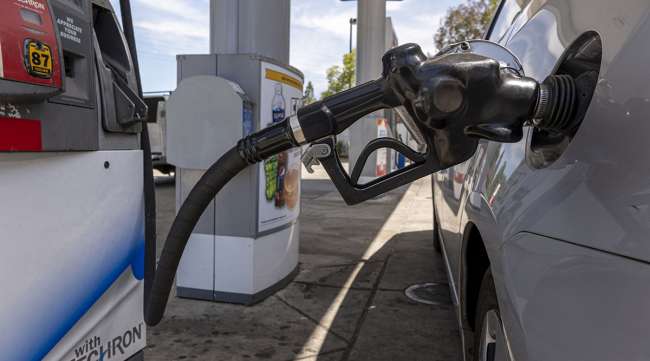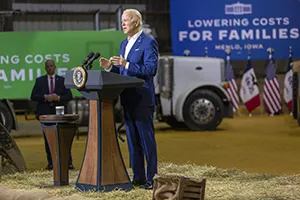Bloomberg News
Biden Sets in Motion Gasoline Policy Shift to Boost Ethanol

[Stay on top of transportation news: Get TTNews in your inbox.]
The Biden administration is advancing a fuel policy shift demanded by Midwest governors who expect it will encourage filling stations to sell higher-ethanol E15 gasoline and offer it year round.
Under the Environmental Protection Agency proposal outlined March 1, the change would take effect in April 2024, sending effects rippling across the fuel supply chain, from refineries to filling stations.
Though the EPA’s move is generally a win for ethanol producers, it’s also a disappointment to industry advocates who called for action by this summer — and on March 1 were threatening to press the issue in the federal courts. Refiners and pipeline operators persuaded administration officials they needed more time to adapt, including by adding equipment to produce, store and distribute a new, lower-volatility gasoline blendstock for the region.
The timetable for when EPA action would take effect is “a recognition of where we are in the calendar and also a recognition of the requirements needed in the fuel production and distribution system to make this change happens,” Ben Hengst, deputy director of the EPA’s Office of Transportation and Air Quality, said during an address at the industry’s National Ethanol Conference.

President Biden speaks at the POET Bioprocessing facility in Menlo, Iowa, in April 2022. (Rachel Mummey/Bloomberg News)
The move responded to a petition from governors of corn-producing Midwestern states who asked the EPA last year to stop giving conventional E10 gasoline a partial waiver from volatility limits meant to curb air pollution. That would put E10 and E15 on the same regulatory footing in their states — and potentially encourage more sales of the higher-ethanol variety. Under the Clean Air Act, the EPA does not have latitude to deny the governors’ request outright, though the agency can delay it in one-year increments.
Iowa’s Republican governor, Kim Reynolds, called the delay until 2024 “arbitrary” and “unacceptable.”
“Iowa won’t accept it without a fight,” Reynolds said. “I look forward to requesting another emergency waiver for this year while at the same time asking the courts to require the administration to grant our request immediately.”
EPA is proposing to remove the E10 waiver in Illinois, Iowa, Minnesota, Missouri, Nebraska, Ohio, South Dakota and Wisconsin. To meet the EPA requirements, refineries would have to churn out raw, unblended gasoline that is less volatile, essentially creating a fuel specifically for those affected Midwest states.
Had the Biden administration swiftly responded to the governors’ petition, the marketplace would have had “more than enough time to adjust” for this summer, said Renewable Fuels Association head Geoff Cooper. “Instead, under pressure from the oil industry, the White House ignored a statutory deadline, sat on the proposal for months on end and slow-rolled governors who acted in good faith to ensure consumers would have the ability to choose lower-cost E15 all year long.”

Host Seth Clevenger chats with Evan Shelley, co-founder and CEO of TruckParkingClub. Hear the program above and at RoadSigns.TTNews.com.
Refiners and industry analysts say the change risks isolating the Midwest’s fuel supply from the rest of the country. Pipeline systems fully contained within the Midwest and refineries primarily serving the region would generally shift to the new specification, but in-region refiners probably would have to find new markets for butane and other cheap, volatile hydrocarbons that lower the cost of gasoline.
“A new Midwest summertime gasoline blend for 2024 and subsequent years would cost more to produce and distribute, reduce overall supply and inflict unnecessary harm on consumers,” said Patrick Kelly, senior director of fuels and vehicle policy at the American Fuel and Petrochemical Manufacturers association. “The push to outlaw the current blend of summertime gasoline and replace it with a boutique blend is going to impose major costs on the Midwest’s fuel supply chain and consumers.”
The change could have uneven effects on prices at the pump. Analysis commissioned by a refining trade group predicts as much as 12 cents more per gallon in added industry costs to make and distribute the new fuel. Biofuel boosters say that the shift would encourage more gas stations to eventually offer cheaper E15 year round, and when it was authorized on an emergency basis last year, it cost nearly $1-per-gallon less than conventional E10 in some areas.
The Biden administration could use the same emergency power to waive E15 from volatility requirements again this summer, said Emily Skor, CEO of Growth Energy.
Want more news? Listen to today's daily briefing below or go here for more info:




